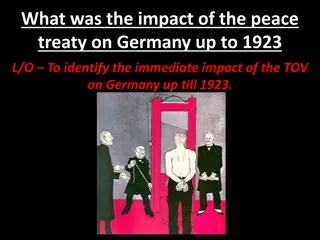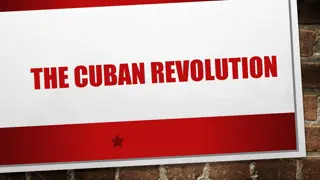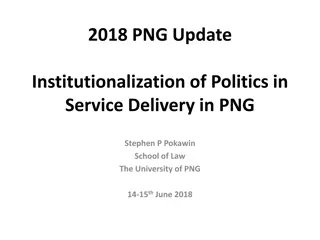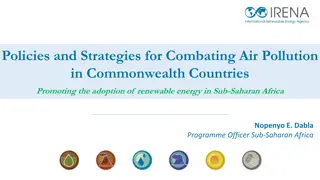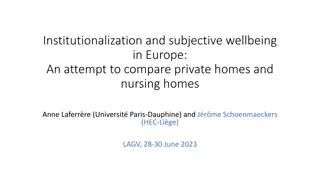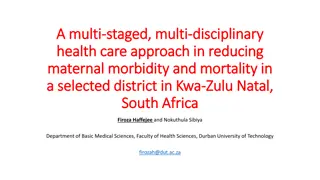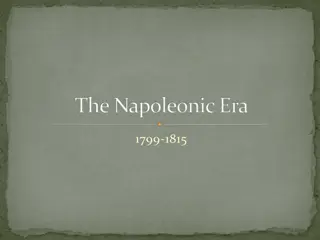Political Institutionalization and Coups in Africa: A Study from 2000-2021
This study by Giuseppe Ieraci and Federico Battera explores the relationship between political institutionalization and coups d'état in Africa from 2000 to 2021. It delves into factors such as election regularity, government turnover, centralization of power, and regime instability to understand the likelihood and outcomes of coups in different political settings.
Uploaded on Sep 27, 2024 | 0 Views
Download Presentation

Please find below an Image/Link to download the presentation.
The content on the website is provided AS IS for your information and personal use only. It may not be sold, licensed, or shared on other websites without obtaining consent from the author.If you encounter any issues during the download, it is possible that the publisher has removed the file from their server.
You are allowed to download the files provided on this website for personal or commercial use, subject to the condition that they are used lawfully. All files are the property of their respective owners.
The content on the website is provided AS IS for your information and personal use only. It may not be sold, licensed, or shared on other websites without obtaining consent from the author.
E N D
Presentation Transcript
Convegno 2022 8-10 Settembre 2022 Universit La Sapienza ROMA, Dipartimento di Scienze Politiche
They Shoot Rulers, Dont They? Political Institutionalization and Coupe dtat in Africa (2000-2021) Giuseppe Ieraci and Federico Battera Department of Political and Social Sciences (DiSPeS), University of Trieste Italy Giuseppe.Ieraci@dispes.units.it Federico.Battera@dispes.units.it
De-institutionalization and breakdown in the Non-democracies. A Theoretical Model COUP D TAT, REVOLUTION, BREAKDOWN Low/Absent political institutionalization Conflict/Rebellion Impairment of the party/organizational channels of mobilization Loss of legitimacy, Conflicting subcultures Socio-economic inequalities Regime Factors Social Factors Source: adaptation from Ieraci (2013a, 2013b).
Hp 1: election regularity and relatively significant levels of government turnover, therefore a relatively high level of institutionalization of democracy, should be associated with the improbability of a coup or in any case with its likely failure. Hp 2: high centralization of the executive power in poorly institutionalized and unbalanced institutional settings should be associated with the likelihood of a coup and with an immoderate political process. Hp 3: Poorly institutionalized settings, such as the non-democracies, which suffer from a weakening of the underlining factors of their regime, should be associated with the likelihood of the coup and with an immoderate political process.
Overview of the coups dtat in Africa (2001-2022) Countries Coups Actors Targets Goal of the actors and political justification Defensive Short term outcome (within one month) After mass protests the President is forced to resign. Long term outcomes (within one year) New presidenti al elections held Dec. 2019 Attempted coup (2015) Previous Coups MALI Mar. 2012 Officers CG and retired generals Defensive Bloodless; Military junta established Still in the hands of the military junta; return to elections in July 2013 Sep. 2020 a retired general is named interim president pending 1968 1991 ALGERIA Mar. 2019 Highest ranks CG 1965 1992 GAMBIA Dec. 2014 Officers (Pres. Guard) Officers MCG Pro- Failure 1994 Democratic GUINEA Dec. 2008 Civil institutions Defensive Bloodless; Military junta established Mass protests and killings; the head of the Junta Camara wounded after an assassinati on attempt; the country prepares for presidenti al elections in 2010 pending 1984 BURKINA FASO Oct. 2014 Officers MCG Pro-Democratic Following popular uprising against auth. regime military takeovers; bloodless Failure and restatement of Trans. Council Bloodless; Assumption of power by the military 1966 1980 1982 1983 1987 Aug. 2020 Officers CG and Highest ranks Against the ruling political coalition Bloodless; Military junta established May 2021 Officers Interim President Defensive Bloodless; the leader of the former military junta acting president Bloodless; Military junta established Sep. 2015 Highest ranks (Pres. Guard) Officers Transitional Council (mixed) Defensive General elections (2015) Jan. 2022 CG Against the ruling political coalition Interim military President removed from office MAURITANIA Aug. 2005 Officers (Pres. Guard) Military regime Pro-Democratic Preparatio n of elections held in 2007 Aug. 2009 elections of the Head of the Junta as President General elections held in Jan. 2011 with the exclusion of previous President 1978 1979 1980 1984 Sep. 2022 Officers MCG Defensive Bloodless; Assumption of power by the military Failure Aug. 2008 Highest ranks (Pres. Guard) CG Defensive Bloodless; Military junta established Against 3rd mandate of the President Sep. 2021 Officers CG Bloodless; Military junta established Bloodless; establishme nt of a transitional CG Failure Against 3rd mandate of the President BURUNDI May 2015 Highest ranks MCG 1965 1966 1966 1976 1987 1996 1975 1982 1990 1952 GUINEA BISSAU Sep. 2003 Highest ranks CG Against the ruling political coalition/ Defensive Legislative elections held in March 2004 1980 1999 Against the 3rd mandate of the President NIGER Feb. 2010 Officers CG Bloodless; Military junta established 1974 1996 1999 CHAD Mar. 2006 Officers MCG Against the ruling political coalition Defensive Failure Aug. 2008 Highest ranks CG Against the ruling political coalition/Defen sive Against the ruling political coalition/Defen sive Defensive EGYPT Feb. 2011 Highest ranks MCG Following mass protests; Bloodless; Assumption of power by the military Following mass protests; Bloodless; Civilian Interim president junta appointed; mass protests followed and repressed Failure Preparing for elections (May 2012) Apr. 2010 Highest ranks CG and Highest ranks Failure and restating of CG S O TOM Jul. 2003 Officers CG Defensive Bloodless; Military junta relinquished power to CG after agreement Bloodless; Creation of a trans. military council 1995 Apr. 2012 Highest ranks CG Bloodless; establishme nt of a National Transitional Council and interim government. Failure Transition lasted up to the 2014 general elections Jul. 2013 Highest ranks CG Defensive Abdel Fattah el- Sisi elected President SUDAN Apr. 2019 Highest ranks MCG Defensive Agreemen t reached on transition governme nt and Constitutio n 1958 1969 1985 1989 Feb. 2022 Officers CG Defensive MADAGASCA R Nov. 2006 Highest ranks CG Against the ruling political coalition Against the ruling political coalition Failure 1972 1975 Oct. 2021 Highest ranks CG Defensive Bloodless; mass protests followed; Reinstateme nt of the CG after 1 m. Bloodless; Vice- President removed the President with the help of the army GABON Jan. 2019 Officers CG Pro-Democratic 1964 Mar. 2009 Highest ranks CG Bloodless; Following popular uprising military takeover; civilian Transitional authority put in charge Failure Power sharing deal between political factions ZIMBABWE Nov. 2017 Highest ranks CG Defensive General elections held in Jul. 2018, Mnangag wa elected President - Legenda: MCG, Militar-Civilian Governments; CG, Civilian Governments Nov. 2010 Officers (special forces) CG Against the ruling political coalition
Countries Coups Free Regular Timing of the Elections Opposition Boycott Turnover Last democratic instauration and lapse to the next coup (years) Elections Year/ Outcome Non-democracy, Institutionalization of democracy and coups d tat in Africa (2001-2022). A Comparative Overview ALGERIA BURKINA FASO 2019 2014 2015 2022 2022 2015 2006 2011 2013 S S F S S F F S S Non-democracy Non-democracy N.a.* Yes Non-democracy Non-democracy Non-democracy Non-democracy Yes N.a. N.a. N.a. N.a.* Yes N.a.* No Yes No 2015 (7) 2015 (7) N.a. N.a. N.a. 2012 (1) BURUNDI CHAD EGYPT Yes No Yes GABON GAMBIA GUINEA 2019 2014 2008 2021 F F S S Non-democracy Non-democracy Non-democracy Yes N.a. N.a. N.a. Yes Yes No 2010 (11) GUINEA BISSAU 2003 2008 2010 2012 2022 2006 2009 2010 2012 2020 2021 2005 2008 S F F S F F S F S S S S S Yes Yes Yes Yes Yes Yes Yes No Yes Yes Yes Yes Yes Yes Yes Yes No No Yes Yes Non-democracy Non-democracy Yes No No No No No No No No No No Yes Yes Yes No Yes Yes No No No No 1994 (9) 2005 (3) 2005 (5) 2005 (7) 2012 (10) 1993 (13) 1993 (16) N.a. 1992 (20) 2013 (7) N.a. N.a. 2007 (1) MADAGASCAR MALI MAURITANIA Yes No Yes Legenda: S, Success of the coup; F, failure of the coup. NIGER SAO TOME SUDAN 2010 2003 2019 2021 S S S S Yes Yes Yes No Non-democracy Non-democracy No No No Yes 1999 (11) 1996 (7) N.a. N.a. * Not applicable: After 2014 coup, in 2015 a coup is attempted against the transitional government in power. ZIMBABWE 2017 S Non-democracy N.a.
Country Type of Election Term of office (yrs.) Re-eligibility Ministerial appointments and dismissals Appointments and dismissals of Head of Cabinet ALGERIA Direct popular 5 Yes Yes Yes BURKINA FASO Direct popular 5 Yes Yes Yes BURUNDI Direct popular 5 Yes Yes No Big men rule in Africa. The procedural resources of the Presidents versus the Cabinets CHAD Direct popular 5 Yes Yes Yes EGYPT Direct popular 4 Yes Yes Yes GABON Direct popular 7 Yes Yes Yes N.a. GAMBIA Direct popular 5 Yes Yes GUINEA Direct popular 5 Yes Yes Yes GUINEA BISSAU Direct popular 5 Yes Yes Yes MADAGASCAR (2007) Direct popular 5 Yes Yes Yes MALI (2020) Direct popular 5 Yes Yes Yes MAURITANIA Direct popular 5 Yes Yes Yes NIGER Direct popular 5 Yes Yes Yes SAO TOME Direct popular 5 Yes No Yes SUDAN (2019) Direct popular 5 Yes Yes No * Reference is to the status quo immediately before and during the coup. Not applicable, the President is the Head of Cabinet N.a. ZIMBABWE Direct popular 5 Yes Yes Source: adaptation from Ieraci (2003, 2010).
Procedural resources Activation of the legislative process 1 1 1 1 1 1 1 1 1 1 1 1 0 0 0 0 Dissolution of parliament Declaration of a state of emergency SCORES Country Veto Power Big men rule in Africa. The procedural resources of the Presidents versus the Legislatures 1 1 1 1 1 1 1 1 1 1 1 1 0 0 1 1 1 1 1 1 1 1 1 1 1 1 1 1 1 1 0 0 ALGERIA BURKINA FASO BURUNDI CHAD GABON GAMBIA GUINEA MADAGASCAR MALI SUDAN ZIMBABWE EGYPT MAURITANIA NIGER SAO TOME GUINEA BISSAU 1 1 1 1 1 1 1 1 1 1 1 0 1 1 1 0 4 4 4 4 4 4 4 4 4 4 4 3 2 2 2 1 Legenda: 1 = presence of the specified presidential resource; 0 = absence of the specified presidential resource. Source: adaptation from Ieraci (2003, 2010).
Coups dtat could as critical junctures? A Conclusion 1. coups d tat are more recurrent and destined to success in non-democracies ; 2. coups d tat can also occur in democracies, but their success rate appears to be reduced; 3. in particular, if democracies register a significant degree of institutionalization, marked above all by the probability of turnover in power, coups d tat are less likely, and in any case more likely destined to failure; 4. the incidence and frequency of coups d tat in Africa even in democratic contexts can however be explained by the spread of institutional arrangements that concentrate power in quasi-imperial presidencies, favouring the rise of big men in a dominant position.



